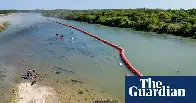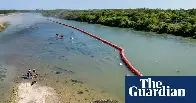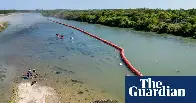DoJ sues Texas governor over refusal to remove anti-migrant buoys from river
DoJ sues Texas governor over refusal to remove anti-migrant buoys from river
Move is the latest in a growing political spat between Greg Abbott and Biden administration over immigration

The US Department of Justice has sued the Republican governor of Texas, Greg Abbott, over his refusal to remove a floating barrier placed on the Rio Grande to stop migrants entering the US from Mexico.
Texas state troopers watch as migrants cross the Rio Grande near the site where large buoys to be used as a border barrier are being deployed near Eagle Pass, Texas, Monday, July 10, 2023. Advocates have raised concern that the barriers may have an adverse environmental impact. (AP Photo/Eric Gay) Texas trooper says they were told to push children into Rio Grande and deny migrants water Read more
The move is the latest in a growing political spat between Abbott and the Biden administration, heightened by Republican attempts to scaremonger over immigration as the 2024 presidential election looms.
The lawsuit filed by the federal government asks a court in Texas to force the state to remove the roughly 1,000ft line of bright orange, wrecking ball-sized buoys the Biden administration says raises humanitarian and environmental concerns.
The suit also says Texas unlawfully installed the barrier without permission, near the border city of Eagle Pass.
The suit was filed on Monday, after Abbott refused to comply with instructions to remove the barrier.
“Texas will fully utilise its constitutional authority to deal with the crisis you have caused,” Greg Abbott wrote to Joe Biden in a letter reported by CNN and other outlets.
“Texas will see you in court, Mr President.”
It was the latest confrontational move by a governor who for more than two years has escalated measures to stop migrants entering the US, pushing legal boundaries along the 1,200-mile border with Mexico.
Blowback over the tactics is widening, including from within Texas and particularly in light of a state trooper’s account of razor wire leaving asylum seekers bloodied and officers denying migrants water in 100F (37.7C) heat and being told to push children into the river.
Last week, the US justice department told Texas to remove the river barriers, citing federal laws against obstructing waterways and imposing a Monday deadline. On Monday, Abbott said that in refusing to comply, he was “assert[ing] Texas’s sovereign interest in protecting [its] borders” in his role as the “commander-in-chief of [the] state’s militia”.
Repeating a common Republican talking point, the governor also wrote to Biden: “If you truly care about human life, you must begin enforcing federal immigration laws. By doing so, you can help me stop migrants from wagering their lives in the waters of the Rio Grande.”
Saying migrants could attempt to use legitimate ports of entry, Abbott said: “While I share the humanitarian concerns noted in your lawyers’ letter, Mr President, your finger points in the wrong direction. Neither of us wants to see another death in the Rio Grande … Yet your open-border policies encourage migrants to risk their lives by crossing illegally through the water, instead of safely and legally at a port of entry. Nobody drowns on a bridge.”
A White House spokesperson said Abbott’s behavior was “ making it hard for the men and women of border patrol to do their jobs of securing the border and putting both migrants and border agents in danger”.
Biden’s border enforcement plan, the spokesperson added, had “led to the lowest levels of unlawful border crossings in over two years. Governor Abbott’s dangerous and unlawful actions are undermining that effective plan.
“If Governor Abbott truly wanted to drive toward real solutions, he’d be asking his Republican colleagues in Congress why they voted against President Biden’s request to increase funding for the Department of Homeland Security and why they’re blocking the comprehensive immigration reform and border security measures that would finally fix our broken immigration system.”
The White House also said Republicans “have no plan and are just playing political games”.
Criticism of Abbott is growing within his own state.
Speaking to the Associated Press, David Donatti, an attorney for the Texas American Civil Liberties Union, said: “There are so many ways that what Texas is doing right now is just flagrantly illegal.”
Aron Thorn, a Texas Civil Rights Project attorney, described “a very strong correlation” between Abbott’s border policy and “the Trump and post-Trump era in which most of the Trump administration’s immigration policy was aggressive and extreme and very violative of people’s rights and very focused on making the political point.
“The design of this is the optics and the amount of things that they sacrifice for those optics now is quite extraordinary.”
In Eagle Pass, Jessie Fuentes, a kayaker, has filed his own lawsuit over work done on the river. On Monday that suit, Epi’s Canoe & Kayak Team v State of Texas, was cited in the suit filed by the federal government.
Citing measures including floating barriers and shipping containers and razor wire placed along riverbanks cleared of vegetation, Fuentes recently told the Eagle Pass city council: “The river is a federally protected river by so many federal agencies, and I just don’t know how it happened.”
A member of the Eagles Pass council, Elias Diaz, told the AP: “I feel like the state government has kind of bypassed local government … and so I felt powerless at times.”
Hugo Urbina, a farmer whose land abuts the river, said he supported efforts to reduce border crossings via the Rio Grande. But Urbina said Abbott and his administration “do whatever it is that they want … breaking the law and … making your citizens feel like they’re second-hand citizens”.
The Texas land office has said it will permit “vegetation management” on the banks of the river as part of anti-migration efforts. The state military department has cleared out carrizo cane, which the land office has called an invasive plant. Environmental experts are concerned changes to the landscape will affect the flow of the river.
Tom Vaughan, co-founder of the Rio Grande International Study Center, said: “As far as I know, if there’s flooding in the river, it’s much more severe in Piedras Negras” – on the Mexican side – “than it is in Eagle Pass because that’s the lower side of the river.
“And so next time the river really gets up, it’s going to push a lot of water over on the Mexican side, it looks like to me.”


